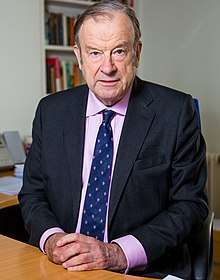John Mills (businessman)
John Angus Donald Mills (born 8 May 1938)[1] is a British entrepreneur, economist and businessman. He founded British consumer products company JML (John Mills Limited), and is its chairman and majority shareholder. The company carries out direct-to-consumer marketing through major retail stores groups and its shopping channels.
John Mills | |
|---|---|
 Mills in 2016 | |
| Born | John Angus Donald Mills 8 May 1938 Hampstead, London |
| Nationality | British |
| Education | Glenalmond College Merton College, Oxford |
| Occupation | Businessman, entrepreneur, economist |
| Known for | Founder and Chairman of JML (John Mills Limited) |
| Spouse(s) | Dame Barbara Mills (Deceased) (m. 1962 – 2011) |
| Children | 4 |
| Parent(s) | Kenneth Mills (Father) |
| Relatives | David Mills (Brother) Dame Tessa Jowell (Sister-in-law) |
| Website | johnmillsuk |
Early life
Mills was born in Hampstead Garden Suburb, the son of British Army Colonel Kenneth Mills,[2] who according to The Independent was a senior spy. At the end of the Second World War, Kenneth Mills was running MI5's operations from Gibraltar. Later, he was transferred to Jamaica and—according to a family legend—personally foiled an attempted revolution in Cuba.[3] Mills' brother is lawyer David Mills, who was married to Dame Tessa Jowell, a former Labour Cabinet minister.[2]
Educated privately at Glenalmond College in Scotland, Mills then read Philosophy, Politics and Economics at Merton College, Oxford.[1][2] Searching for extra income as a student, he started selling household cleaning goods door-to-door, and in 1958 hired a plane to fly fellow students to Canada for summer jobs, making a profit by selling off the seats.[2]
After two years of National Service, he joined Unilever's graduate scheme, but quit after six months to start his own business. Charged by Trading Standards for selling brass trinkets as gold-plated jewellery, he pleaded guilty and was fined £750.[2] Mills founded Fairlane UK Ltd., which initially sold imported products at trade fairs and exhibitions, and latterly manufactured them. As the pound rose during Margaret Thatcher's government, Fairlane UK went out of business in 1984.[2]
Economics and politics
Mills is on the board of various eurosceptic lobby groups, and charity boards including SANE.[2][4]
A supporter of and major donor to the Labour Party,[2] he served as a councillor for the party in the London Borough of Camden for most of the period between 1971 and 2006. He contested Chipping Barnet at both general elections in February and October 1974, but was defeated both times by the Conservative former Chancellor of the Exchequer, Reginald Maudling.
During his tenure on Camden council, he held a number of political appointments; including Deputy Chairman of the London Docklands Corporation, Chair of the Housing Committee at the Association of Metropolitan Authorities and the London Boroughs Association, and Chair of both the Housing and Finance Committees of the London Borough of Camden. In 2013, it was revealed he had donated £1,650,000 to the Labour Party in JML shares, making him the party's biggest financial donor.[2][4]
Mills has published a series of books on economics,[5] a subject on which he also blogs. Mills' published books include 'A Critical History of Economics'. He has also published books advocating a deep devaluation of sterling and criticising the economics of the Eurozone.
In July 2018, he resigned from Labour Leave, Labour Future, The Pound Campaign, Business for Brexit, and Labour for Britain, to comply with Ofcom requirements and avoid any conflict of interest through also running a TV shopping channel.[6][7]
In popular culture
Mills was portrayed by Nicholas Day in the 2019 Channel 4 drama, Brexit: The Uncivil War.[8][9]
Personal life
He was married to barrister Dame Barbara Mills QC from July 1962, shortly after they both graduated from Oxford, until her death in May 2011; the couple had a son and three daughters. He lives in Camden, London, and Avignon, France.[7]
In 1995, he was stabbed and seriously injured in a mugging in north London. The muggers had also been involved in the murder of Philip Lawrence.[10]
Selected publications
- John Mills, Why Trump Won (Labour Future Ltd, November 2016)
See also
References
- Levens, R.G.C., ed. (1964). Merton College Register 1900–1964. Oxford, UK: Basil Blackwell. p. 506.
- Meet John Mills – Labour's biggest donor, The Daily Telegraph. Retrieved 10 April 2016.
- McSmith, Andy (25 February 2006). "David Mills: The networker". The Independent. London, UK. Archived from the original on 18 May 2007. Retrieved 13 August 2007.
- John Mills – the Labour millionaire donor behind the snuggie and fast fit ironing board cover, The Daily Telegraph. Retrieved 10 April 2016.
- "Catalog Biz". Catalog Biz. Archived from the original on 18 March 2012.
- "Statement: Stepping down from political organisations". John Mills. Archived from the original on 5 July 2018. Retrieved 4 July 2018.
- "John Mills". John Mills. Retrieved 28 February 2020.
- Bennett, Asa (28 December 2018). "Brexit: The Uncivil War review: Benedict Cumberbatch is superb in this thrilling romp through the referendum". The Daily Telegraph. ISSN 0307-1235. Retrieved 8 January 2019.
- Matthew Elliott (4 January 2019). "Vote Leave's Matthew Elliott on Channel 4's Brexit: The Uncivil War". Financial Times.
Screenwriter James Graham has turned the campaign into a compelling story – and nailed my mannerisms
- Watson-Smyth, Kate (17 December 1997). "Youths committed series of horror crimes". The Independent. Archived from the original on 6 December 2016.